How To Train To Become A Video Game Designer
Home » How to Become a Pro Video Game Designer: Learn Video Game Design the Smart Way
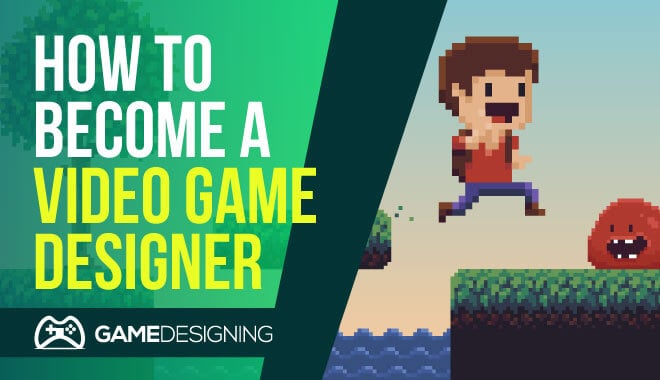
You want to learn how to become a game designer?
Please don't read that with a derisive tone; you really want to design games, and you're going to get there, with time.
This guide is designed to help you make informed decisions about your education and career, on the path to becoming a video game designer.
You'll Learn About:
- The differences between game design and game development
- The career path
- Your education
- Work experience
- The hiring process
- Promotions & career advancement
This guide can be read from start to finish, or you can dip in and out to what seems most relevant to you.
Designing Games is Awesome – But It's Competitive
Video game design is a competitive business, and in order to secure a position as a junior designer, you'll need to put yourself above the rest.
Check out the sections on work experience and education to find out how to give your resume an edge, and then read about the hiring process to find out exactly what you can expect on your way to landing your first job.
Game design might seem like a hard business to get into, and it can be, but with the right edge, you'll have no problem outshining the competition.
So let's get right into it!
Game design degrees vary by institution, but there are common elements to all game design courses:
How do you become a video game designer? Follow these six steps:
- Get more familiar with Game Design
- Get an Education (find quality training)
- Start building your game design portfolio
- Land a game design internship (or volunteer)
- Apply for game design jobs
- Crush the hiring process (screenings & interviews)
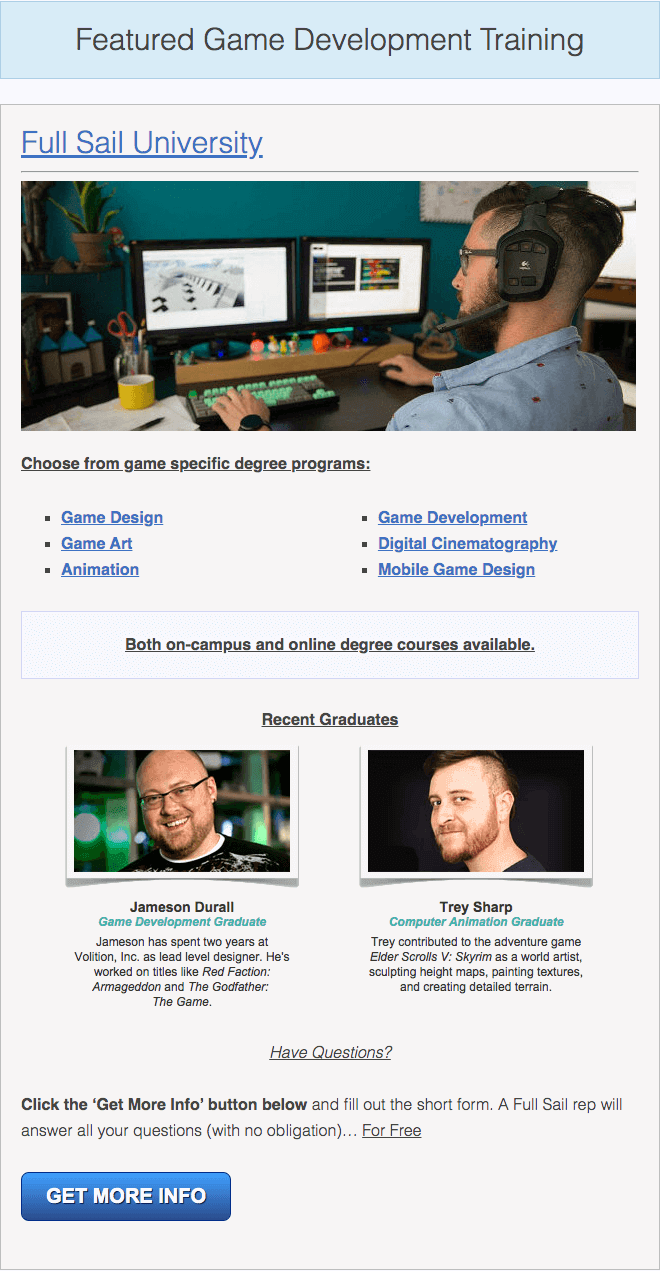
Video Game Design vs Game Development
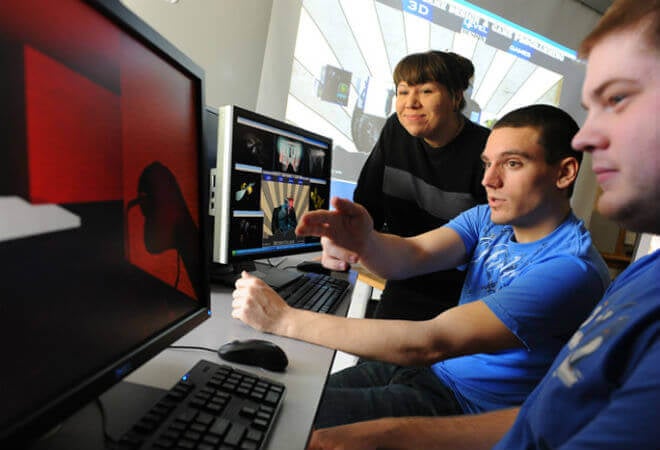
First of all, we need to talk about the difference between game design and game development.
The two are often used interchangeably, but they are two distinct career paths.
Game design often includes the creation of:
- new game concepts
- mechanics
- storylines
Game development tends to refer to the making of games, from the animation through to engine programming.
It's a bit like the difference between the driver of a car, and the engineer who builds the car.
Designers and Developers Need Each Other
Without each other, the tasks are useless (what's the point in being able to drive if no one is making cars), so you need both to make a functional vehicle.
In this example, the driver would be the designer, and the engineer would be the developer.
The driver/designer's job is pointless if there's no one to engineer the car or develop the game.
And there is no point in the developer/engineer building something that no one is going to use.
You should always bear in mind that both are equally important in the overall process of making games.
However, whilst the two roles are distinct career paths, they feed into each other continuously.
The designer gives input and direction to the developer, and the developer feeds back with their improvements to the game.
They both need each other to develop the best game possible. And for that reason, it's good to have a strong understanding of the other career path to the one you choose.
Is a Career in Video Games for You?
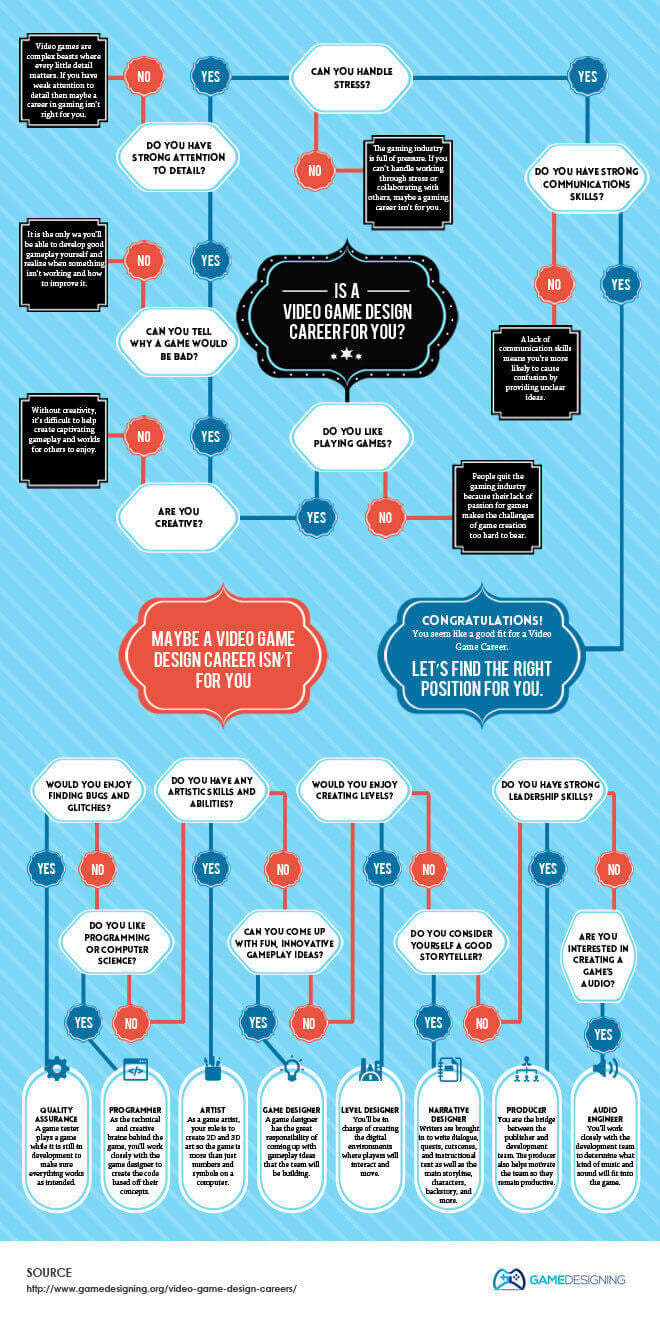
Paths Into The Gaming Industry
So you can see the two differ in subtle ways, but are in fact two distinct paths through the games industry.
What you decide to make the focus of your career will depend on your talents and interests, but you still need a good understanding of what the other career path does in order to be the best you can be.
This guide is about the game design though, so let's get to it.
Talking About Game Design
One of the most important things an aspiring game designer can do is to talk about design.
You probably already talk about bad design a lot, if you're a fan of video games, but it's a lot harder to talk about good design because sometimes the design is so good you don't notice it's there.
This section is all about learning to talk about design in an insightful and helpful manner, and it will become a vital skill – both for interviews and for explaining your ideas to your design and development team.
Talking About Bad Design
As I already said, talking about bad design is easy; we all do it, all the time.
Think of a game you dislike.
Go on, do it.
Now when you want to be a designer, it's not enough to just think "I don't like this game", you need to think about why you don't like it.
To start with, this can just be a simple reason, like "character X is boring".
But why are they boring?
Keep asking questions until you can't ask anymore, and you'll have got to the root of the problem.
Now you've identified what you've done wrong, it's just as important to identify how it could be fixed.
Fixing Bad Video Game Design
Fixing bad game design is sort of the same process as identifying bad design, but backward.
Think about how you fix the core issue you have with the game.
Perhaps you didn't like having to hold X to run.
So you'd want to fix that – but how would that affect the next layer up?
Keep working up the chain, ironing out kinks, until you think you've 'fixed' the game into a more acceptable state. Then, after making note of what you changed and why work out what else needs fixing.
Sometimes it's more about small changes than big ones and experiments with both little changes and literal game-changers.
Talking About Good Design
Good design is often harder to talk about because it's much harder to identify why you like something than to identify what gets on your nerves.
Thinking about good design often starts with a feeling; I like this game, I love this character, this mechanic works well.
Then, once you've begun to pinpoint what makes a good game great, you can begin to dig deeper.
Take mechanics for example – if you think a particular mechanic works well, why does it work well?
Perhaps you're drawing a blank, but it's easier to think about a change again – what would happen if you changed it for another mechanic?
This should help you identify what goes into making a game good.
But why did they do that?
Whether or not you think a design choice is good or bad, it helps to think about why the designer made that choice.
This is especially important for bad design choices – why did the designer not make a better choice?
Perhaps it was a limitation, perhaps they thought it was a good idea given other constraints.
This will help you talk about why designers made those choices and what you would do differently, but it will also give you insights into what it'll be like when you yourself become a game designer.
Career Path Overview
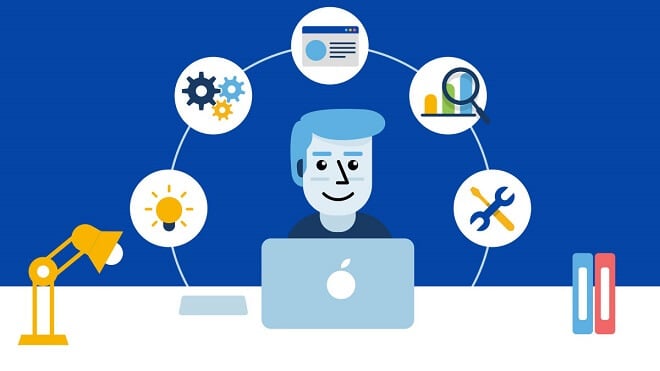
I would be lying if I said there was one way into the industry as a game designer because there are so many ways to do it, I couldn't even count them all.
There are more common ways to get to be a game designer and more obscure roots.
For example, I got to be a designer by:
- Completing a degree in Artificial Intelligence (think robots trying to read and understand, that was my dissertation project),
- Doing business training
- Starting my own studio
I am now a consultant designer.
Other people take a more traditional route, by studying game design-related courses at college and taking internships by the bucketful, before securing a position as a junior designer for a big game company.
By far the most common route involves:
- Game design-related courses and specializations at college
- Taking internships and work experience
- Securing a role in a large, established company (before moving on with their career)
The game designer career progression past junior game designer includes:
- Becoming a senior designer
- Becoming a lead designer on a project
- Starting your own consultancy (where you help other companies by helping them with the design elements)
- Or starting your own studio!
If the end result for you is game design, there are a number of ways to get here.
This guide covers the most common route, but remember to network and try other avenues because you never know exactly what's around each corner.
Getting a Great Education
It cannot be stressed enough that getting into the best college can definitely help your career; more established colleges often have:
- More links to industry
- More networking opportunities
- May even be able to set you up with an internship or two
You don't need to be in an Ivy League school, but if you're stuck for a choice over two-game design schools, go with the one with the better reputation.
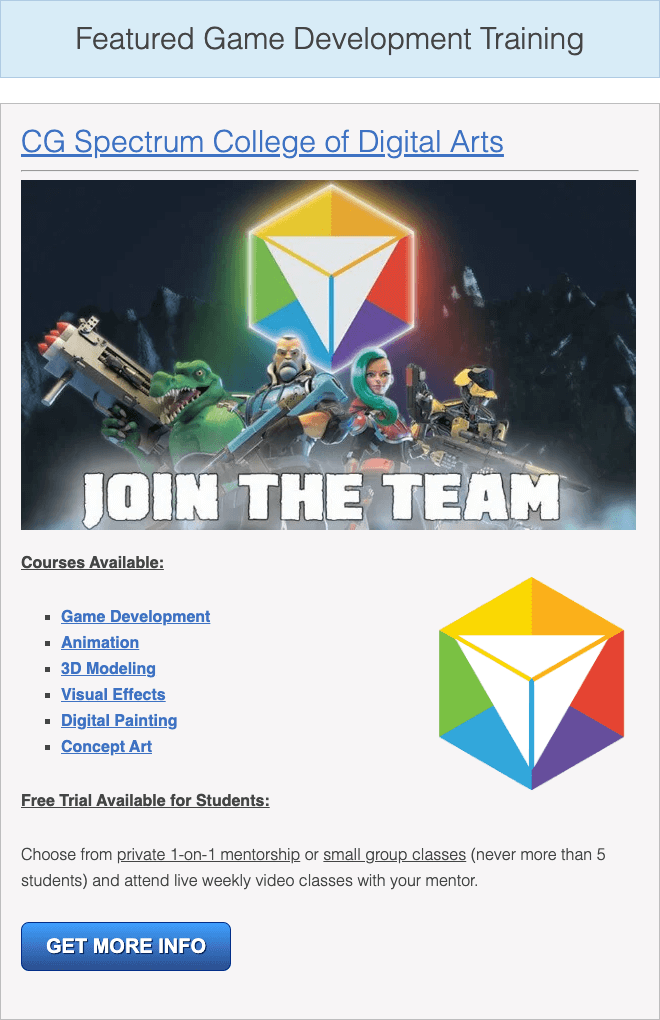
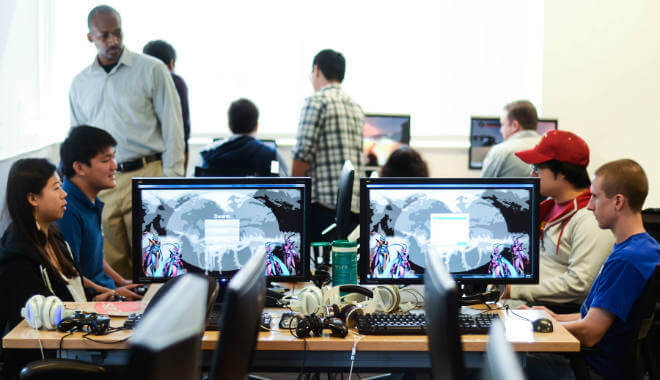
- Computer science
- Game design
- Practical programming
- Mathematics
- Logic
You might be wondering why I only mentioned the word 'game' once in a list of themes in a game design degree – it goes back to what I was saying earlier about the interplay between designer and developer.
To be a good designer, you need to understand what your developers are working with, so you design to their specifications.
Let's look at each of the themes in turn.
Computer Science

Loosely speaking, computer science is everything about how computers work and why they work; from hardware to software and everything in between.
You'll learn about:
- operating systems
- programming methodologies
- algorithms
- input/output
- among other things
Learning about the constraints within which computers operate will give your design direction – and you won't start demanding impossible things of your developers.
Game Design
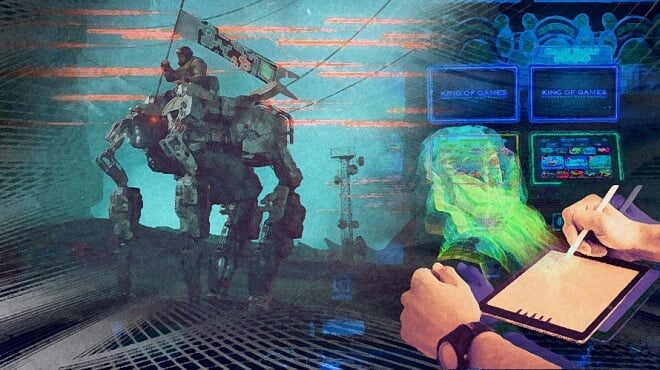
Arguably the most important part of a game design course is the bit on actually designing games.
You'll learn about:
- mechanics
- game logic
- storyboarding
- structure of design
- how to produce all the documentation that the design team will require of you (game design documents, character profiles, I could go on…!)
It's as much about practical game design as it is about the administration of the process, and it's about making you a valuable part of the team from day one.
Programming

From time to time, a designer may be asked to step into the shoes of a developer and perform simple coding tasks to make the game run more smoothly.
This transition between roles needs to be smooth for both you and the company, and programming courses will help make it just that.
From algorithms to for-loops, you'll know all about how to make a computer do what you want.
Mathematics and Logic

Formal logic is a bit of a beast (X is true if and only if Y is false and Y is true if and only if…), but unfortunately it's something you need to get to grips with because it makes it a whole lot easier to define your ideas about mechanics design (you know, all that stuff you learned in your game design course).
Mathematics is similar; being able to calculate a route between two points might seem meaningless until you look at in the context of programming enemy AI to find the player.
Other things to do at college
College should, above all, be a fun experience – but that doesn't mean you shouldn't combine fun with enriching experiences which might help further your career.
Love music?
Take a formal composition course and learn how to write music – games always need soundtracks, and being able to advise on this element will make you a more valuable game designer.
The same can be said for other creative classes and anything that builds leadership and business skills.
Work experience
The final thing you should think about while you're at college (and I know I've already given you a lot to think about) is internships and work experience.
Thinking in advance about how you will spend your summer means that it won't be a summer wasted on the path to your dream career.
Employers really do look for students with work experience in the industry, so securing at least one placement as part of your degree or over summer is a worthwhile thing to do, no matter how hard it might be.
How to find an internship

There are loads of websites out there, from the bottom with Craig's List all the way up to purpose-built job-hunting sites, where employers can list internships and work experience opportunities.
Most of these sites have the employer pay the fee for listing the job so that you can browse positions for free.
If you live near a city, send in resumes to any local studios.
If you live a little further away, offer to do work long-distance.
Above all, persevere.
You will receive a lot of rejection letters.
Unfortunately, this is all part of the process. Eventually, you'll find somewhere, and if you don't, there's always next summer!
Be cautious about not being paid for your work; although it is common for employers to only pay their interns' expenses, be sure to try and negotiate a pay deal out of the company.
This will mean you can support yourself over the summer and afford to live near the studio you're working for.
The Hiring Process
In a nutshell:
- Writing a Resume and Cover Letter
- Initial Screenings
- Telephone Interviews
- Technical Interview
- Final Interview
- Your First Job (including your first day)
- Signing the Contract
- Your First Day
- Getting a Promotion
The path to becoming a game designer doesn't end with school; very rarely do people walk straight out of college and easily into a designer role with a big studio.
Most have to apply to many positions with many different studios, and be prepared to settle for a studio that is not, perhaps, your favorite.
Getting the job in itself is a multi-stage process (rarely do people hire based on one interview), with many types of interviews and assessments to test your mettle.
Writing a Resume and Cover Letter
Your resume should include a brief overview of your professional and academic background, and leave the interviewer wanting to read your cover letter.
How to write a good resume is beyond the scope of this guide, but there are plenty of guides online.
As a rule, your relevant work experience should come first, followed by your education, followed by an 'other skills' section (where you would include leadership skills, etc).
A cover letter accompanies the resume and explains who you are and why you would be perfect for the job.
Be brief but be passionate, show your enthusiasm, and your understanding of the industry.
Initial Screenings
A 'screening' refers to a process that weeds out the less equipped or enthusiastic for a particular role.
They generally include aptitude tests for mathematics or programming skills, perhaps a few written questions (a small piece of design work, for example), and always include submitting a resume and cover letter.
You'll probably go through a lot of screenings in your career, and there is a knack to them; you can practice many examples for free online.
Telephone Interviews
Some companies, especially ones based a distance away from you, may operate a telephone interview system.
Treat it exactly as you would a 'real' interview, even down to dressing the part (it'll help put you in the right mindset).
Technical Interviews
Technical interviews are by far the most common kind of interview in the industry.
They are designed to further test your technical skills to determine if you are qualified enough for the job.
Again, there is a skill to taking a technical interview; be positive but don't boast, and don't be afraid to ask for help if you need it (or for clarification if the question is unclear).
Final Interview
If you make it to the final interview, a congratulation is in order; getting to the final interview is hard and worthy of celebration in itself.
A final interview is usually to decide between you and a few other candidates.
Be passionate, easy-going, and professional, and you'll be fine!
Your First Job (including your first day)
So you went to the final interview and nailed it – they rang you and said you got the job.
Congratulations! …Now what?
Signing the Contract
Your job should issue you with a contract (if they don't, pressure them for one), which you will need to sign prior to commencing employment.
Contracts should layout your terms of:
- Employment
- Your wages
- Anything you are entitled to (such as holiday and bonuses)
Read the contract carefully before signing it.
Non-disclosure and intellectual property
Most companies will get you to sign a nondisclosure agreement (NDA) and an intellectual property ownership document.
It is usual for you not to be allowed to talk details about work to outsiders, and for any ideas, you come up with to revert to the ownership of the company.
Don't worry too much about this – so long as your name goes on the credits, you should be able to use the work as part of a portfolio (just make sure to ask permission first!).
Your First Day
You've signed your contract and you've turned up on time for your first day, but what can you expect?
Well, the first day is often an exercise in getting used to the workings of the company; don't expect to be coming up with new game ideas on your first day!
Once you've got used to the company and the workings of the team you're in, you'll often be asked to start by reading other people's documentation and making gameplay or story suggestions.
This is to get you used to the documentation as well as getting you to contribute ideas.
You'll slowly be asked to contribute more and more to different projects, depending on what the projects need.
Networking and Connections
Arguably one of the most important skills you will learn on the job is how to network (and I don't mean that in the sense of computer networks!).
Learning how to talk to people outside of your team is an invaluable skill, and it will help you further your career.
You never know who you will speak to next, or who might know of a job opening or chance for change.
You should always come prepared for a networking session – no one wants a telephone number on a scrappy piece of paper, so make sure to bring business cards.
They don't need to be expensive to look professional, and you can experiment with color and shape to make yours stand out.
Know what you want to talk to people about, such as any openings they might know about.
Prepare an elevator pitch of yourself, including your job title and what you do, to make introductions go a bit more smoothly.
Getting a Promotion
Once you've landed a job, the next thing you'll probably be interested in is a promotion.
Not only does promotion come with a bigger paycheck and more perks, but it also helps you develop professionally by giving you more chances to use your skills and learn new ones.
There are plenty of routes for promotion within the path of game design.
Some involve climbing the chain of authority, whilst others involve moves to completely separate departments.
You may choose to take on more responsibility and authority within the team you are currently based with.
This could take the form of you being promoted to a senior designer position, or even to a lead designer role further on in your career.
Lead video game designers are often responsible for one project at a time, whereas a senior designer will have an overview of several projects for which they are responsible.
Other career path promotions might involve you moving studios, or even starting your own and promoting yourself! Never close your ears to an opportunity, as it might be exactly what you are looking for.
How to Get Into the Gaming Industry

Here are a few helpful ways to propel your career into a full-time game designing gig.
Post your work on discussion boards
Posting online is a great way to get your work out there. Posting on Steam discussion boards, subreddits, and other online forums can introduce your work to gamers and get constructive criticism.
Start a gaming blog
What are your thoughts on gaming? How far are you in your game design? Keep the public updated with a few of your ideas in a personal gaming blog.
Build your own indie games
Building and experimenting with your own games can be a fantastic way to jump right into the deep end of game design.
Get an entry-level job as a Game Tester
Testing games is a great way to familiarize yourself with game development and how games work.
Get an internship at a video game studio
Getting an internship can help your breakthrough and possibly line up a game development job, depending on where you intern.
Get a video-game related college degree
Getting a college degree in game design is now a more common educational pathway. Check out some of the best game design-related degrees to get you on the right path.
Get a traditional college degree
Just because you don't pursue a game-related major doesn't mean you don't have a chance at landing a game developing gig. Getting a bachelor's degree is traditionally the first stepping stone to any career.
Get a job at a gaming studio in a non-game development position
Immersing yourself in the culture of game development can give you a better idea of how games are created, modified, and launched.
Participate in game jams
Game jams are unique exercises in game development. For example, the Global Game Jam is an annual gathering of thousands of game developers. At the Game Jam, developers band together and attempt to make games from scratch. This is a fantastic exercise in creativity, collaboration, and experimentation.
Be persistent, and don't give up
Maybe the most crucial facet of game design is not giving up. It seems complicated (and it is). However, it is by no means impossible. If you persist, you can end up creating your dream game and sharing your ideas with thousands.
Final Thoughts
Game design is a rewarding career path, there's no doubt about it.
The joy one experiences from watching others gain pleasure from their work are incredible.
But it's also a lot more hard work than the average person thinks, what with all the schooling and interviews and networking.
If it's your passion, you'll find your niche, even if it takes you a few tries. Remember above all that your career should be fun and fulfilling, and you'll be fine.
Written by Dustin Tyler [Updated June 14, 2021]
 Initially focused on web dev, Dustin was introduced to game design by a friend after college and was immediately attracted to the combination of technical skill and creativity required to make an awesome game.
Initially focused on web dev, Dustin was introduced to game design by a friend after college and was immediately attracted to the combination of technical skill and creativity required to make an awesome game.
While not a professional game developer himself, he's utilized his web dev skills and desire to help others by creating a resource where expert game designers can share what they've learned with the next generation of aspiring game makers. Meet the rest of the team.
How To Train To Become A Video Game Designer
Source: https://www.gamedesigning.org/become-a-game-designer/
Posted by: parisibehisellin.blogspot.com

0 Response to "How To Train To Become A Video Game Designer"
Post a Comment